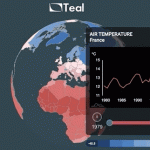WEMC Directors share careers advice at exciting time for meteorology and energy students
The start to 2021 for the WEMC team has been focused on education. We were part of two bids for initiatives supporting the EU Green Deal call for education to ‘enable young people to act on climate change’, we launched a new climate and energy tool, called Teal, with the aim of making factual climate data freely available to citizens around the world and we have compiled some timely advice for young people, keen to support the energy transition with their career choices.
A recent survey by The Ecologist revealed that the next generation are keen to play a role in helping to offset the impact of climate change with 50% of young brits wanting a job in the green economy;* so with this in mind two of our senior WEMC directors offer timely advice on pursuing a career in meteorology and energy. We asked them:
“What advice would you offer to younger researchers or students looking to progress further into the study of meteorology and energy?”
Sue Ellen Haupt is WEMC Director of Research, and also Senior Scientist and Deputy Director of the Research Applications Laboratory (RAL) at the US National Center for Atmospheric Research (NCAR), which progresses research in all areas of atmospheric science, from building climate and weather models, to planning and operating field observational campaigns.
“The timing is great to pursue a career in meteorology and energy. The world’s energy is in the midst of a major transition to renewable energy, which because of its dependence on the weather for its fuel, necessitates understanding and predicting (on many scales) the weather and climate. This creates many opportunities for experts to apply their skills to help provide substantial energy to lift people out of poverty, equalize access to energy, and power economies of the future. To be part of this exciting transition, you’ll need to understand more than just the weather and climate, you’ll need skills in using big data, including analysis using more traditional statistical approaches as well as modern machine learning. In addition, communication skills are key – learn not only to speak and write well, but also to listen and understand the needs of the stakeholders. Finally, aspects of social science are becoming increasingly important so that solutions to problems are accomplished in a way that make them usable.”
Laurent Dubus is WEMC Founder and Non-Executive Director and an expert & lead scientist in weather and climate with RTE, the French Transmission System Operator, with a focus on long-term power system evolution and resilience to climate change, and short-term supply-demand balance. Laurent advised:
“I’d say first gain a solid background in weather and climate, and/or energy systems. Mixed curricula in meteorology and energy are now available which wasn’t the case 10 years ago. In addition to that, I’d say the most important thing is to collaborate, and not compete. A multi-disciplinary approach is very important when solving complex problems. Thinking out of the box often leads to innovation. Modesty and curiosity are also good ingredients: don’t hesitate to look at how other fields are treating similar problems; you’ll always get something out of it. And last, don’t hesitate to raise your ideas, modestly but confidently. And if you fail, try again. And again. And again.”
It’s an exciting time to explore or progress a career in the energy transition and according to a recent report** by the International Renewable Energy Agency (IRENA), renewable energy could employ more than 40 million people by 2050 under IRENA’s climate safe energy path. At WEMC we are keen to play our part now by joining with others to bid for the Green Deal initiatives and reaching out to the next generation with educational tools and activities that drive awareness of climate change and encourage behavioral change. A key principle in the development of Teal, our newly launched historical climate and energy data tool, is to ensure young people are not locked out of information about climate change for their home country, giving them the opportunity to assess climate change just like a scientist now.
Explore the tool for free at tealtool.earth.
Got a question you would like to ask our expert WEMC directors about progressing further in the study of meteorology and energy? Just add a comment, email info@wemcouncil.org or share it on Twitter
* https://theecologist.org/2020/aug/24/young-want-green-jobs




